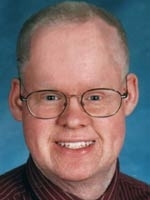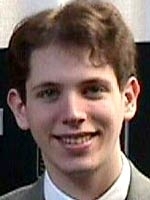Two MIT seniors and a graduate student who received the S.B. and M.Eng. last June have been awarded Marshall Scholarships for 2003.
They are graduate student Samidh Chakrabarti of Corvallis, Ore.; and David Foxe of Sussex, Wis., and Alexander D. Wissner-Gross of New Hyde Park, N.Y.
"All have superb academic and service records and are extraordinary in every way," said Professor Linn Hobbs, chair of the MIT Foreign Scholarships Committee.
SAMIDH CHAKRABARTI
Chakrabarti graduated last summer with a double major in EECS (S.B. and M.Eng.) and in brain and cognitive sciences. He will interrupt a Ph.D. program in artificial intelligence to study history of science for two years at Oxford University. A Burchard Scholar, he has won MIT prizes for essay writing, science writing, engineering writing and computer system architecture. He was the leader of the national student organization Students for the Exploration and Development of Space and has done notable research on microgravity.
His M.Eng. thesis was on schemes for accelerating the speed of Internet connections in developing countries, which he tested out during sojourns in Ghana and Kenya. He has traveled to 15 countries in Africa, Asia, Europe, Latin America and North America.
"Ultimately, I want to be a science policy adviser in government, working with or for the Congressional Science Committee or the Office of Science and Technology," Chakrabarti said in his application. "In particular, I hope that my career will afford me the opportunity to champion science education programs. This 'democratization' of science is essential--if the public is more educated about scientific principles, our country can make better policy decisions."
Hobbs described Chakrabarti as an "outspoken, clear-headed idealist" regarding space research and a "selfless volunteer and teacher" in his African projects. "I expect we will see him enter public policy debates, turning to public service or even--given his ebullient personality--to politics," said Hobbs. "He is a leader with a seemingly limitless capacity to listen, learn and lead."
DAVID FOXE
Foxe is a double major in architecture and music. He is also an accomplished photographer, and has both architecture designs and musical compositions archived in the MIT Museum. Foxe, also a Burchard Scholar, was a member of the Simmons Hall Founders' Group that worked with architect Stephen Holl to design the living spaces and define the culture of the new MIT dormitory. He will attend Cambridge University, combining his two majors in a study of the application of musical paradigms to architectural design. A percussionist and tympanist, he played with the MIT Symphony Orchestra on tour at Cambridge University last summer.
Hobbs described Foxe as "a scholar who integrates effortlessly over seemingly separate fields, and a practitioner who exploits the demonstrated overlap to provide new ways of seeing and hearing."
Foxe said that while at Cambridge, he plans to "investigate how people perceive architectural space through the language and media of other disciplines," particularly music. "Architects try to use the metaphors of music, for example, to express ideas about how time affects the perception of space; they use literature to express notions of narrative and character in architecture," he said. "Instead of viewing interdisciplinary metaphors as a confusing obstacle, I seek to use my insider experience in multiple areas to use synaesthetic description as an asset in design and communication."
ALEXANDER WISSNER-GROSS
Wissner-Gross is a triple-major in physics, electrical engineering and mathematics. His research has focused on nanotechnology and he has two sole-author patents to his name. An Intel Science Talent Search winner and a Goldwater Scholar, he plans to attend Cambridge University to study physics and biochemistry. At age 10, he performed with the New York City Opera Company.
"Alex Wissner-Gross is one of the most remarkable students at MIT," said Hobbs. "He is the last student to perform a triple major, an option that was discontinued because only the most exceptional students were able to complete it. He is clearly endowed with superabundant intelligence and no small measure of organizational skill and stamina."
"I remain the impressionable child, dazzled and exhilarated by the science I see before me," Wissner-Gross said in his application. "I share in the thought that the world is on the verge of another industrial revolution--this time fueled by fundamental engineering--and personally think that nanoscale information technologies will be crucial to improving the human condition."
BACKGROUND
Marshall scholars must demonstrate outstanding academic achievement and a capacity to make a significant contribution to society. The scholarships, given every year since 1953, are awarded by the United Kingdom as a national gesture of thanks to the United States for aid received under the post-World War II Marshall Plan. Winners may attend any British university.
Forty Marshall Scholars are chosen each year from more than 1,000 applicants who apply to one of eight regions centered on the eight British consular districts in the U.S. Notable Marshall Scholars include Supreme Court Justice Stephen Breyer, former Interior Secretary Bruce Babbitt, electronics entrepreneur Ray Dolby, New York Times Pulitzer Prize-winning columnist Thomas Friedman, more than a hundred chaired professors at U.S. universities, and the presidents of five major U.S. universities.








